“Operation—Annihilate!”
Written by Steven W. Carabatsos
Directed by Herschel Daugherty
Season 1, Episode 29
Production episode 6149-29
Original air date: April 13, 1967
Stardate: 3287.2
Captain’s log. The human colony of Deneva has gone quiet. It’s also on the path of a series of planets that have all suffered mass insanity over the past several centuries. The most recent was Ingraham B a few years ago.
Sulu picks up a one-person vessel headed directly for the sun. Before the ship burns up, the pilot finally responds to Uhura’s hail, saying that he’s done it and that he’s free. And then he’s dead.
McCoy is concerned that this suicide, along with the radio silence, is an indicator that Deneva is suffering from the mass insanity. Kirk tells Uhura to try a particular subspace code, one that’s for personal use—it belongs to his brother, George Samuel Kirk, who is stationed on Deneva along with his wife Aurelan and their son Peter.
Uhura finally gets through on the private frequency, and it’s Aurelan. She’s desperate for help, but she cuts off the transmission after a second.
A landing party that includes Kirk, Spock, McCoy, Scotty, Yeoman Zahra, and a security guard beams down. They wander around for a bit, as they paid good money for this location shoot, before finally talking about how empty the city is. According to Kirk, there are over a million people on Deneva, including 100,000 in this city, but they’re not on the streets. According to Spock, though, the people are there, just in hiding for some reason.
They go to Kirk’s brother’s lab, and are accosted by four people with clubs. They stun them with phasers before they can attack, but they were also screaming a warning and expressing concern for the landing party’s safety. Even after being stunned, McCoy is reading tremendous central nervous system activity.
They hear a woman scream, and Kirk cries, “Fan out! Follow me!”, which are two contradictory instructions. The woman screaming was Aurelan, who keeps crying that “They’re here!” Lying on the floor is Sam Kirk, dead. Next to him is Peter, who is still alive. Kirk and McCoy beam up with Aurelan, Peter, and Sam’s body.
Aurelan’s hardly affected by the tranquilizer, yet she’s barely coherent, talking about “horrible things” that came on a vessel that arrived from Ingraham B. Apparently the “things” forced the crew of the ship to bring them to Deneva. When Aurelan answers questions, whatever’s affecting her kicks into high gear. Eventually, it kills her after she informs Kirk that the Denevans are being forced to construct ships.
The landing party has heard a strange buzzing sound, which they were about to investigate when Kirk beams back down. They chase it down, and find goopy flying omelettes that zip through the air and attack them. They hit one with a phaser, but it recovers quickly and attacks Spock, attaching itself to his back. Kirk gets it off him, but the puncture wound has had a profound effect: Spock has Aurelan’s ability to burn through sedatives, as McCoy and Chapel do exploratory surgery on him. There are tentacles all over Spock’s nervous system, and McCoy found similar ones in Aurelan’s body. The tentacles are too intertwined with the nervous system to be removed via surgery.
Spock leaves sickbay and bursts onto the bridge, trying to take over the helm. It takes five people to bring him down long enough for McCoy to give him a sedative. He’s put back in sickbay in restraints. McCoy determines that the victims of this creature are in constant pain—it’s no wonder they go binky bonkers.
Spock insists that he is able to keep the creature under control now that he understands it. The creature wants the ship, and Kirk can’t take the chance that Spock won’t try to take over the ship again. However, if Spock can maintain control for a significant period, Kirk will reconsider. To make matters worse, Peter and the rest of the Denevans are going through the same thing.
After McCoy and Kirk leave, Spock breaks out of the restraints and goes to the transporter room. Scotty refuses to beam him down, and Spock tries to force the issue, nerve-pinching a technician and throwing Scotty into a wall. However, Scotty holds him at phaserpoint until Kirk can arrive. Spock explains that he is now immune to the creatures, and so he is in a unique position to capture a creature for examination.
Kirk agrees to let him beam down, inexplicably letting him off the hook for disobeying orders and assaulting two fellow crewmembers. Spock does so, fending off an assault by a Denevan, and finally returning to where he was attacked. He is having great difficulty controlling himself, belying his insistence to the captain that he has it all under control. Spock phasers a creature and puts it in a case.
Bringing it back to the lab, Spock theorizes that it is one cell, part of a much larger organism. Kirk remembers that the Denevan who flew into the sun said he was free. They have to find a way to kill the creatures, or Kirk will be forced to destroy Deneva, killing all of the million people down there, not to mention Spock and Peter.
Unfortunately, nothing they try works. But while both heat and radiation are attempted, they didn’t try bright light. McCoy is skeptical, but Kirk reminds him that the creatures kept to the shadows—they may be sensitive to the bright light of the sun. They try it on the creature, and it works, but they need to test it on an infected subject first. Spock, of course, volunteers.
The good news: it works. The bad news: Spock is now blind. Given the intense pain he was in, he’ll take the trade. However, it turns out not to have been necessary, as the lab results come back on the creature they hit with the light, and it turns out that the creatures are specifically vulnerable to ultraviolet light that isn’t visible to the human or Vulcan eye. They could have done this without blinding Spock.
The Enterprise deploys a mess of satellites to blast the planet with UV, which succeeds in killing the creatures and curing the Denevans. And then Spock wanders onto the bridge, fully sighted. Turns out that Vulcans have an “inner eyelid” to protect them from Vulcan’s bright sun. So all is well.
Can’t we just reverse the polarity? The creatures are a kind of hive mind, with each one acting like an individual brain cell that infects a person to be controlled so they can use opposable thumbs and stuff. They’re also very sensitive to UV.
Fascinating. Spock can pull the most useless trivia out of his ass at a moment’s notice, but he has somehow totally forgotten about a biological facet of Vulcan eyes. Oh, and he once again suffers no consequences for assaulting fellow officers.
I’m a doctor not an escalator. McCoy doesn’t have the best day ever: Aurelan dies in his sickbay, Spock breaks out of sickbay twice, and he blinds Spock before getting the lab results back and discovering that he didn’t need to. To make matters worse, Spock knows that McCoy called him the best first officer in the fleet.
I cannot change the laws of physics! Scotty shows remarkable good sense in pulling a phaser on Spock after the latter throws him into a wall.
Hailing frequencies open. Uhura does a very nice job of explaining calmly to Kirk why she can’t get Aurelan back on the line, and while Kirk doesn’t apologize for being an ass, he at least stops blaming her for something that isn’t her fault.
Ahead warp one, aye. Sulu gets thrown across the bridge by Spock. In revenge, Sulu is one of the five people who subdue him.
Go put on a red shirt. Security totally fails to stop Spock from getting to the bridge from sickbay.
Channel open.
“My first sight was the face of Dr. McCoy bending over me.”
“‘Tis a pity your brief blindness did not increase your appreciation for beauty, Mr. Spock.”
Spock describing his emotional experience upon regaining sight, and McCoy telling him he’s a big stinky.
Welcome aboard. Joan Swift plays Aurelan and Craig Hundley plays Peter, with William Shatner doubling as the body of Kirk’s brother. Fred Carson and Jerry Catron play two other Denevans. Maurishka plays Zahra, the latest member of the Post-Rand Yeoman Derby, alongside recurring regulars James Doohan, George Takei, Nichelle Nichols, and Majel Barrett.
Trivial matters: This is the first time any family members of the crew have been seen, in Kirk’s brother, sister-in-law, and nephew. No mention is made of Kirk’s other two nephews, who were referenced in “What Are Little Girls Made Of?” alongside Kirk’s brother and sister-in-law. The only other crew member whose family will be seen on the series is Spock—we’ll meet his fiancée in “Amok Time” and his parents in “Journey to Babel.” The only other crew family we’ll meet will be in the films: Peter Preston, Scotty’s nephew, and David Marcus, Kirk’s son, in The Wrath of Khan; Demora Sulu, Sulu’s daughter, in Generations; Spock’s half-brother Sybok in The Final Frontier; and Kirk’s parents in the 2009 Star Trek.
Peter never gets any dialogue, as he’s unconscious for the whole episode, but he did have a scene filmed at the end where he talks with Kirk about how he’ll still live on Deneva with Sam’s partner, which is why Craig Hundley gets billing despite not having a speaking part (the scene was cut for time). The character never shows up again onscreen (nor is even mentioned), but he does appear in a goodly number of novels, stories, and comic books. Three of note are the novels Gemini by Mike W. Barr and Sarek by A.C. Crispin, and the comic book story “Bloodlines” by Ian Edginton, Carlos Mota, and Keith Aiken in WildStorm’s Star Trek Special.
The Vulcan inner eyelid will only be referenced once again on screen, in the Enterprise episode “The Forge,” though it will show up periodically in other bits of tie-in fiction.
Deneva is mentioned in any number of tie-in novels, particularly The Final Reflection by John M. Ford, Crucible: McCoy: Provenance of Shadows by David R. George III, and Rise of the Federation: A Choice of Futures by Christopher L. Bennett. The world was all but destroyed by the Borg in the Destiny trilogy by David Mack.
Scenes on Deneva were filmed at the TRW Space and Defense Park in Redondo Beach (which nowadays is the headquarters of Northrop Grumman’s Aerospace Systems division).
The original draft of the episode did not involve Kirk’s family. James Blish’s adaptation in Star Trek 2 reflected that, and also didn’t include Spock being blinded or the inner eyelid.
Stephen W. Carabatsos had served as story editor on the show, and while he had left by this point, his contract obligated him to write at least one script. He wrote this one for the season finale, based on a concept Gene Roddenberry tossed at him.
Scotty makes a reference to how single-minded and determined Spock can be when he puts his mind to something, probably a reference to his actions in the framing sequence of “The Menagerie.”
This is one of only two Trek episodes to have an exclamation point as part of its title—the other is Voyager‘s “Bride of Chaotica!”—and the only one to have an em-dash as part of the title.
To boldly go. “I’m free!” This really had all the makings of a good episode, and it’s an impressive example of a total botch of it.
The first problem is that the central point of Kirk’s family being among those endangered is totally wasted because William Shatner’s performance is completely emotionally subdued. He should be feeling sad about losing his brother and sister-in-law and angry about the danger to his nephew, but mostly he just looks constipated. This is especially disheartening coming one episode after Shatner so totally sold Kirk’s falling in love with Edith Keeler.
On top of that, the artificial suspense of Spock’s blindness is tired. Leonard Nimoy is second in the opening credits and at this point was the most popular character on the show by a lot. There was no way he was going to stay blind. To make matters worse, the blindness was unnecessary (McCoy couldn’t wait ten minutes for the lab results?) and was handwaved in the most pathetic manner possible. The entire season has shown that Spock basically knows everything and has also gone to great lengths to show us how proud he is of his Vulcan heritage—yet he somehow totally forgets about the inner eyelid? Seriously?
On top of that, Spock breaks out of sickbay, disobeys orders, and assaults two crewmembers, actions which have absolutely no consequences, even though, at best, they show that Spock’s judgment is completely impaired, and at worst should get his halfbreed ass thrown in the brig.
In the end, we’re left with a hoary monster-of-the-week tale, as the crew are endangered by gooey omelettes that fly through the air, which are pathetic special effects even by the papier-mache-rock standards of Star Trek. A lackluster end to the season.
Warp factor rating: 2
Next week: Season 1 overview
Keith R.A. DeCandido‘s Heroes Reborn eBook novella Save the Cheerleader, Destroy the World is now available for preorder. One of six novellas tying into the new NBC series, Keith’s tale will be released on the 20th of November, and can be preordered from Amazon, Barnes & Noble, or Kobo.










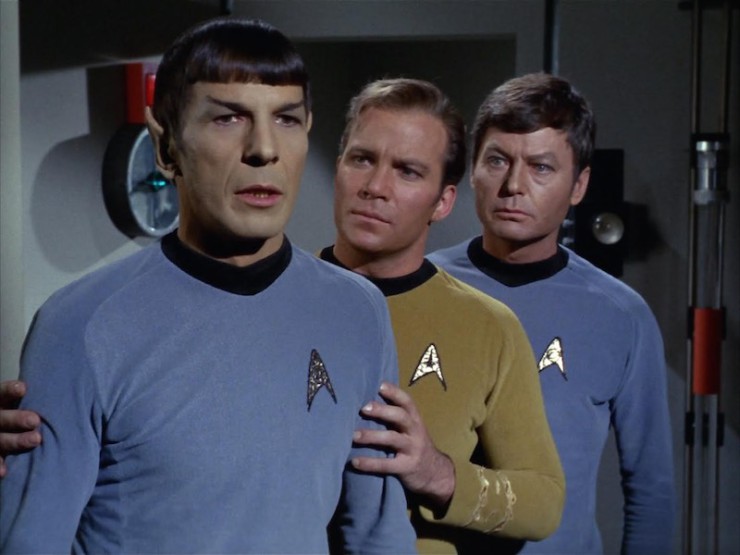
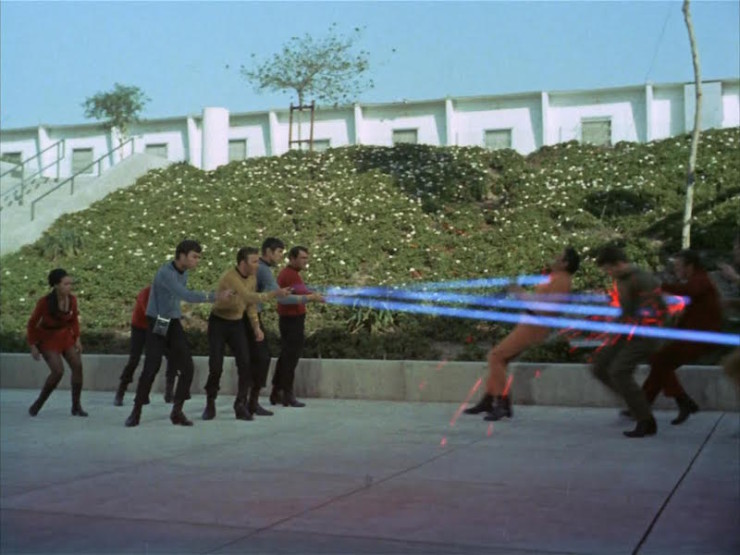
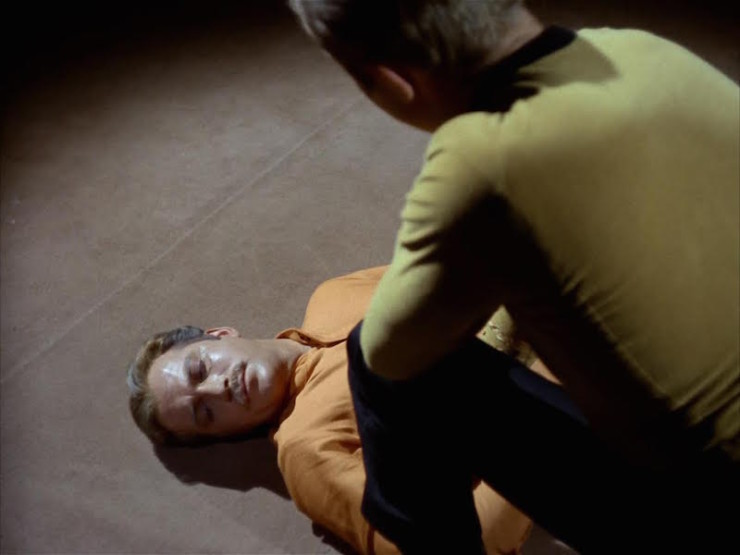
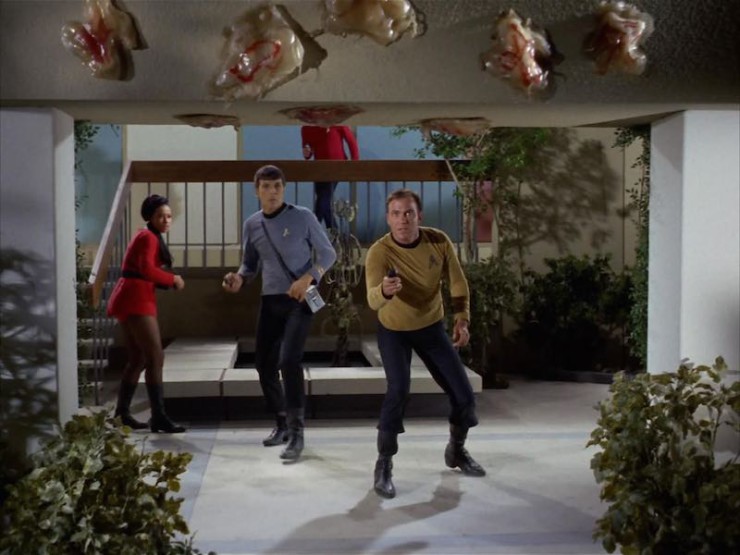
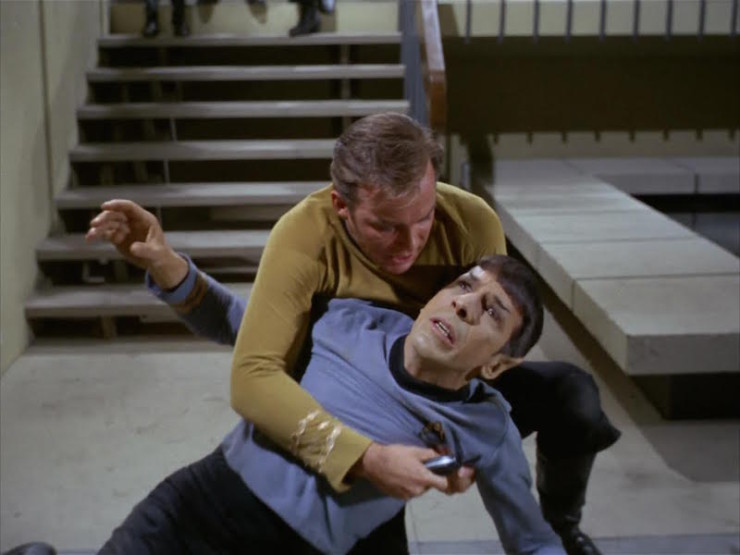
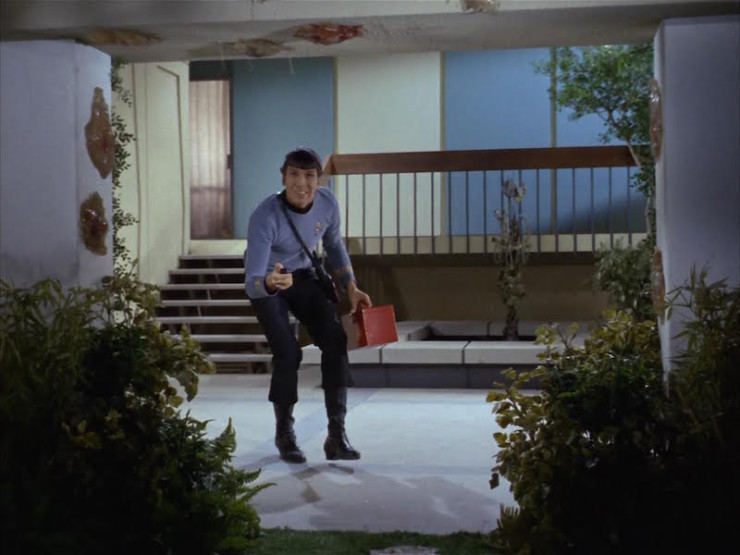
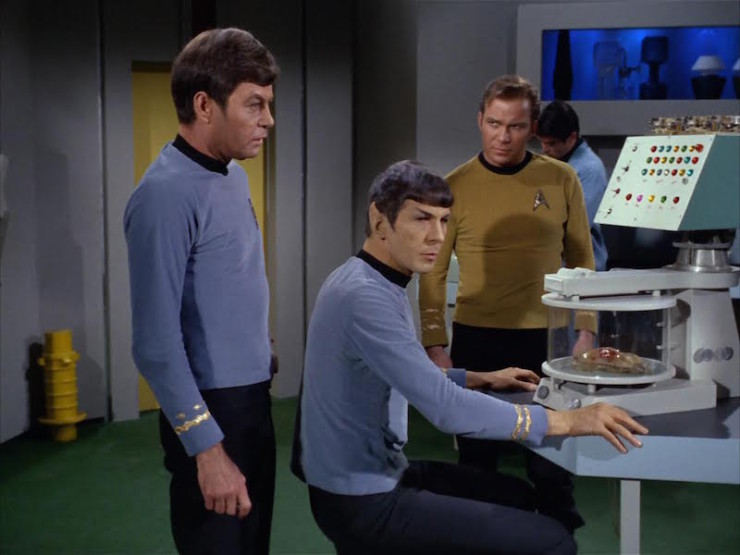
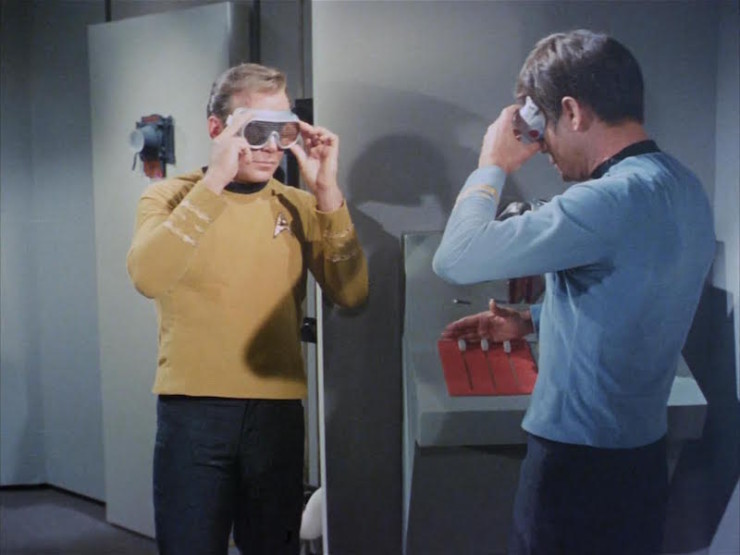
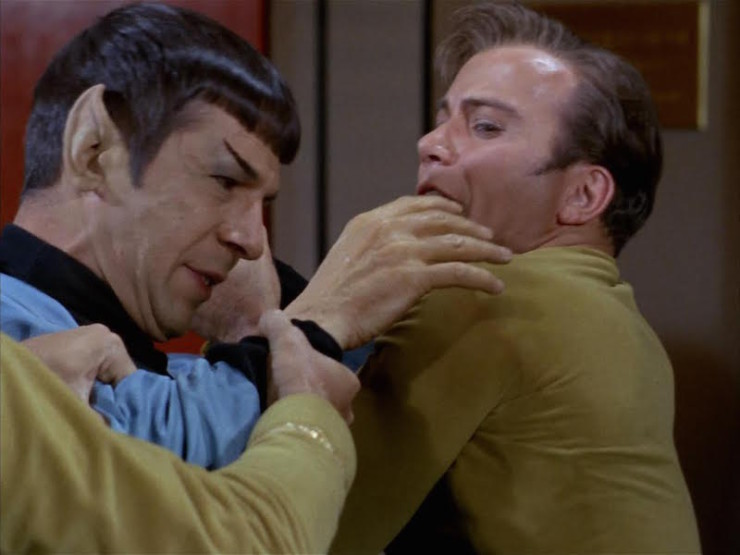
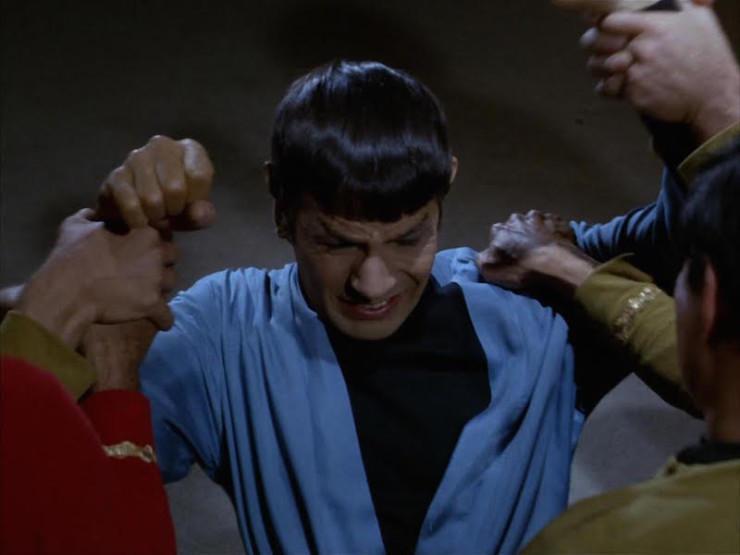
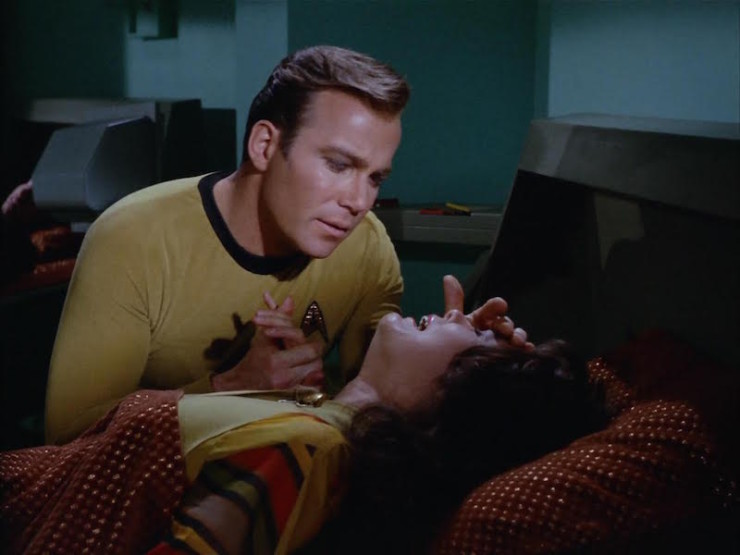
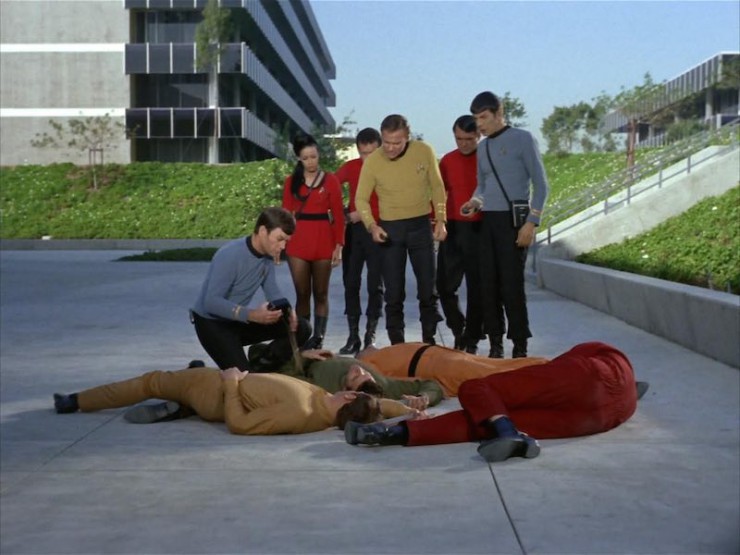
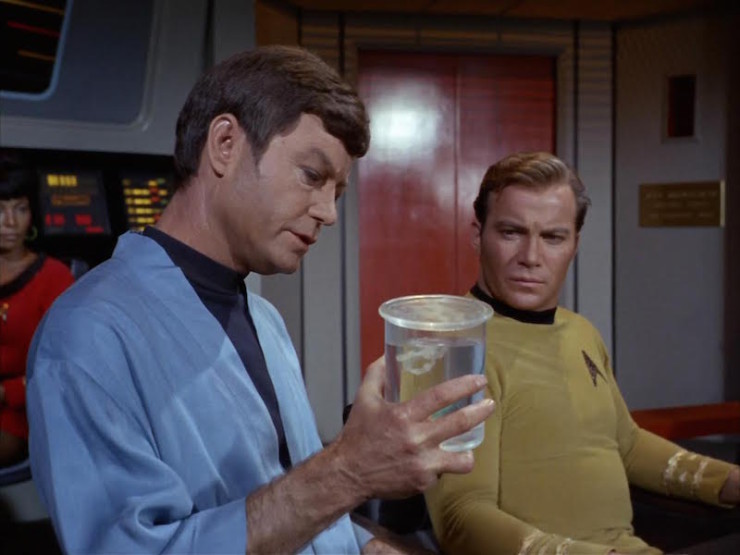
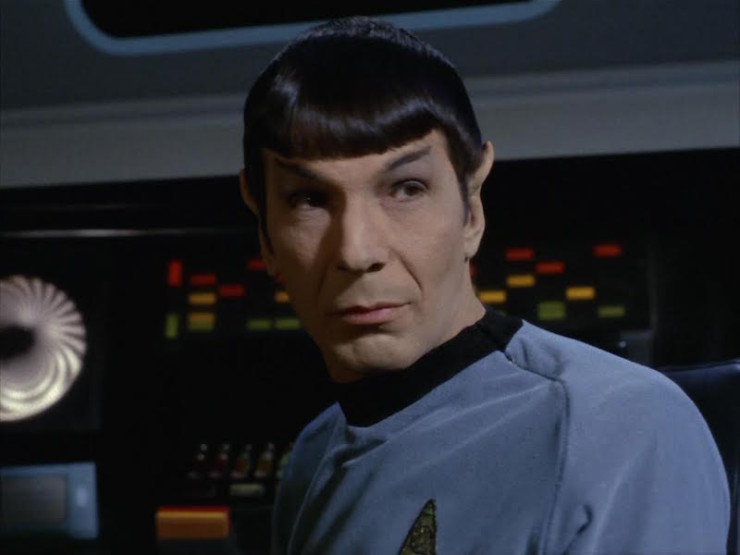
“Gooey omelets that fly…”
== Continuing a conversation with KRAD that started with TNG’s “Conspiracy,” the creatures are flying =pancakes!= (Aside from this and my opinion that DS9 had the best title music–admittedly, I may be biased as a trumpet player–I defer to KRAD on most things Trek.)
As to the episode, I agree that the plot has holes, though I give the creative team some credit for attempting to come up with aliens that weren’t humanoid.
I agree with everything except the comment on the creature effects. I think the snot frisbees still look pretty good. They look alien, but not in a cardboard or forehead ridge sort of way.
...he has somehow totally forgotten about a biological facet of Vulcan eyes. — Well, maybe we could hand-wave it away by saying, a la pon farr, he wasn’t sure if it applied to him since he was half-human. But, yes, it’s a cheat solution. Had this been a TNG episode, perhaps — or definitely a DS9 episode — there would have been at least some time in which Spock had to learn to cope with blindness, even if he didn’t stay blind forever.
Maybe Kirk is subdued because he just loved and lost Edith Keeler? He’s so emotionally raw, he can’t properly feel the danger to his family (whatever properly feel might mean… different people handle situations in emotionally different ways). I don’t actually think there was this kind of story logic at work, particularly since the episodes weren’t filmed in this order (were they?), but it’s easy enough to retcon, if one wants…
This was one of the earliest episodes I ever saw, in sixth grade, syndicated late-night reruns, and I loved it. I still do (although I admit I haven’t watched it in a while… but I think I still love it!). And I still think the flying pancakes are creepy.
Seems the lesser praised episodes of Trek have gotten me farther into the Trek sandbox. Voyager’s “Threshold” led me to get published in Strange New Worlds and this episode eventually got me invited to pitch to Voyager at Paramount.
About four years before Voyager aired, I had written a pilot for Star Trek Atlantis, about a starship thrown into another galaxy and left on its own. In the incident that caused the premise, the captain was killed and First Officer Peter Kirk assumed command.
One day, five years later, after a pitch to DS9, I took my pilot script downstairs to the Voyager office. Everyone was at lunch and I did something completely unprofessional. I left the script and a note on Jeri Taylor’s desk.
I got a call within a few days and an invitation to pitch.
Thanks, Peter.
It occurred to me that this episode feels inspired by Heinlein’s THE PUPPET MASTERS, with the “gooey omelettes” bearing a crude resemblance to the “slugs”
This is one of the TOS episodes I remember watching as a kid, and I’m not ashamed to admit that it gave me the creeps. I can’t remember anything about the plot (I was six or seven at the time!), but the flying omelettes made me terrified to go through a doorway without checking the wasn’t something lurking to swoop down on me for several weeks afterwards…
I didn’t think it was all that terrible. Yes the family relation was kind of wasted (especially with no mention of Peter at the end) and Spock should get disciplined in some way (Tbh what bothers me even more than him not getting reprimanded was his motivation – Why would he act like he did, even though he was supposed to be in control? It makes him seem like he’s not, which should be obvious to him. He could just have gone to Kirk and asked in the first place..). And a tiny nitpick on top that, I don’t buy that they get every creature with that UV light. It would take an incredible intensity to light everything, even spots insides caves or in cellars or whatnot where the light would have to be reflected several times to reach it.
Still, I kind of enjoyed it. We all know Spock won’t go blind, but I think if you watched it in the original run, especially if you didn’t follow every episode, I’d say it’s a reasonable amount of suspense. And while nothing else really stands out, I feel like the pacing works and it’s all around a decent episode. Oh and the special effects were bad, but so was e.g. the Horta and that didn’t get any criticism iirc.
That Captain’s Log summary really makes the point that it’s kind of ridiculous this is even happening: “It’s also on the path of a series of planets that have all suffered mass insanity over the past several centuries. The most recent was Ingraham B a few years ago.” Good Lord! When the Federation figured that out maybe something should have been done it to move the colony or increase warnings and surveillance!
I remember this episode fondly, but your write up reminds me Kirk’s family is misused in this one. Maybe it was there to fill in some extra time but not so much that Kirk had to really get all emotional about the loss of his brother. It seems like the story should have had Spock infected or Kirk’s family infected to make this personal for the Enterprise crew but not both because there wasn’t enough time to do the emotional impact to Kirk justice.
When I watched this for the first time, it really annoyed me for two reasons. One was the fact that they didn’t wait for the lab results before they experimented on Spock, and the other one was the fact that the science team thought of every possible property of the sun… except light. Really? Light? That’s what they need the outsider with the unconventional ideas for? May I run the science department, please?
But I actually liked William Shatner’s performance after it turns out that Spock didn’t have to be blinded – when Kirk says “Bones”, there’s all that accusation in that one word, and then he stops, and obviously doesn’t want to reproach McCoy, but isn’t able to say anything else either, so he just says “Take care of him” and runs off. I thought that was well done.
Yeah, I always called them flying pancakes, like Don S. said.
This episode is so damn stupid. How in the world could they test “radiation” on the creatures and somehow not include ultraviolet radiation? How could both Spock and McCoy be unaware of the inner eyelid? How could McCoy examine Spock’s eyes and not be able to recognize the difference between blindness and a nictitating membrane? And if they were going to expose Spock to bright light, why not give him a freakin’ blindfold rather than let him be blinded?
Keith, I used Deneva as the setting for a significant portion of Enterprise: Rise of the Federation — A Choice of Futures.
@3/Mike: Yes, the Rewatch is going in production order, not broadcast order. But in the case of “City on the Edge” and “Annihilate,” both orders are the same.
Oh, by the way, something is screwy with Tor.com lately. Every day for the past four or five days, there have been periods when I could not get comments to load no matter how many times I tried reloading the page or even switching browsers. Anyone else having this problem?
@10: Yes, I’ve had the same problem. Thought it was my connection, at first, but it happened on more than one access point.
@5 Russell: I came in here to mention the similarities to Heinlein’s mind-controlling slugs, but you beat me to it!
@10 Christopher: I’ve been having the same problem frequently, and I found a way to load the page. I click on “skip to newest”, which refreshes the page with an extra “#comment-54668” (or whichever number) tagged to the end of the URL. I remove by hand that part of the URL and click enter (to reload the page without the #comment), and as the page reloads the comments are now visible.
I think the episode’s heart is in the right place. It tries to balance tension with conflict, and is reasonably well directed. I even appreciated Shatner’s performance. Had they kept some of the family drama instead of sweeping the nephew aside, this could have been an effective companion piece to City on the Edge of Forever, bookending the season with Kirk in an emotionally compromised state.
Plot-wise, this falls apart. I knew this was going to get heat from Keith because of the Vulcan eyelid plot contrivance alone. This felt rushed. Carabatsos phoning it in. But it was the end of the season, with everyone burned out, and after going through such a good run of episodes, this was screaming to be a bit of a blunder. It’s too bad, because I always enjoy stories like these, and it made good use of location shooting.
I’m going to defend the visual effects, though. They felt appropriately creepy for the era they were made in. And, as it was pointed out, at least they went for something different, and avoided reusing humanoid aliens as a threat, for once. At least TNG would do this kind of parasitic alien story more effectively with Conspiracy.
This episode does help solve a perennial gripe about TNG and families being on the Enterprise. People always say why don’t they leave families in safety on planets, but episodes like this show that Trek-verse space is not like our space. It is loaded with things that kill planetary settlements by the bucket load, leaving your kids planetside is just begging for a “We regret to inform you” message from Starfleet command to your posting.
As for Spock’s blindness, with all the hindsight of entirely too many years of genre experiences it is so obvious it would not be permanent (not to mention the hackneyed way they went about it). However, I remember watching this episode as a young child, one of the earliest ones I can remember watching (if not the actual first, memory is hazy), and one of the things I do remember very clearly about it is being utterly distraught about Spock being blinded and utterly over the moon when he was “cured”. In that rollercoaster of emotion, Star Trek -and Leonard Nimoy- captured my young girl’s heart. For all its faults, I can’t fault it.
@ChristopherLBennett
why not give him a freakin’ blindfold rather than let him be blinded?
Or at least a pair of those goggles pictured in the recap? That always bugged me about this. Not only can’t they wait 10 minutes, but they make zero effort to protect his eyes after making an effort to protect their own…
And yep, the monsters are flying pancakes. :P
I’ve been having problems on and off with comments showing up ever since the upgrade. Sometimes a refresh works, sometimes I need to go back to the main page then reload the post.
15: Well they mentioned this actually – the reason they give is that they want to replicate conditions on the planet as closely as possible, so because those on the planet won’t have goggles, Spock shouldn’t have any for the test. Still doesn’t make any sense though. You don’t really need to run a test to know that looking into a light source as bright as the sun from a small distance is going to blind you…
Yeah, Spock deliberately refused eye protection because he wanted to have the same exposure that the Denevans would. And the same McCoy who didn’t think of UV radiation when testing what a sun would do did think that made sense. Gotta love it.
If I remember correctly, Blish’s adaptation had it be the sun’s magnetic field that did it. But he didn’t have the cheap suspense of Spock going blind, either….
Christopher: thanks for the heads-up — I threw the ROTF book in with DRG3 and Mike Ford’s mentions of Deneva. :)
—Keith R.A. DeCandido
@12/LuisMilan: Thanks for the tip about the comments, but Tor.com really needs to fix this buggy “upgraded” system, which has been nothing but trouble from the day it went live. It’s so incredibly sluggish and cumbersome compared to the old software.
@14/Random22: Heck, our planet is dangerous enough. A kid can get killed crossing the street or commuting to school, or in a natural disaster. There is no perfectly safe place for families to live. And of course, any setting in an adventure TV series is going to be in constant danger, whether it’s a starship or a city or a school.
As a kid watching this, I always thought Spock had been blinded but the light that would have permanently blinded a human had only temporarily blinded him because his inner eyelid kicked in and gave him added protection.
@19/Ellynne: You know, that actually makes a lot more sense, if you mean the eyelid closed during the exposure and then retracted again, which is why McCoy didn’t see it. Looking at the dialogue, I’d say it’s perfectly consistent with your interpretation (as long as we ignore the nonsensical line about his inner eyelid being associated with his “optic nerve”). Indeed, maybe that’s what they intended all along, because it doesn’t make sense that the inner eyelid would just stay closed for hours after the exposure had ended.
So I have to hand it to you. You’ve come up with a far more sensible interpretation than the one I’ve always assumed to be the case.
@17 Yes, in Blish’s adaptation it was magnetism that freed the Denevan who flew towards the sun. But Blish also took it in a different direction by having the crew realize that killing the individual cells (am I the only one who calls them pizzas?) wouldn’t be good enough and they ended up looking for a more massive creature and killed it, which rendered the individual cells harmless. (Kind of like the Gravis in the Doctor Who episode “Frontios”.) I didn’t like the creature being presented this way and preferred the way the televised episode did it but on second thought, didn’t Blish work with early versions of the scripts?
@21/richf: In this case, yes, Blish was working from an earlier draft. Some of the changes he made in his early adaptations were a mix of early-draft material and his own original interpolations, including elements from his original SF; he basically wrote his early Trek adaptations as if they were taking place in his Cities in Flight universe. The adaptations in later volumes got more screen-accurate, since by that point, fans were able to see the episodes frequently in reruns and notice when the adaptations changed things.
Of all Blish’s adaptations, though, none is more divergent from the final episode than “Operation — Annihilate!” It’s a wholly different story, and a better one in a number of ways.
By the way, IDW’s Star Trek Ongoing comic set in the new movies’ universe did a 2-parter depicting the alternate-universe version of this episode, and I think it was one of their better adaptation/reworkings. Interestingly, it features a Sam Kirk who’s very much alive.
Spock may have been barely in control, but he was not mastered by the critter (at least after the sedative wore off). And Kirk let him beam down etc. because Spock was right, as usual.
The blobbies were reasonably scary, especially back then, and I still appreciate how Star Trek tried to give us alien aliens, and am still disappointed by the parade of bumpy foreheads the future would bring us. TAS excepted, of course!
Why do the blobbies (and the Doomsday Machine) have a plottable base course? Did they have a destination?
Spock not knowing about his other eyelid is poorly thought out. At best. A smple version of “dazzled” or temporary blindness would’ve sufficed.
How deeply does UV penetrate? Not deep enough to affect any infecting blobbie, I don’t think.
Family emotional drama? Meh. I was over that then. I do appreciate that Kirk’s brother and sister-in-law weren’t saved, unusual for TV of any time.
CLB @10- Different sites blocked by ad or script blockers seem to affect comment loading for me since the upgrade update. Dunno if that helps you.
@LuisMilan: I tried your workaround when the comments wouldn’t load again (third or fourth time today that’s happened, BTW), and it didn’t work for me.
@23/sps49: Depending on what UV frequencies we’re talking about, they shouldn’t even have made it through the atmosphere, because of the ozone layer. After all, if Deneva’s star radiated enough UV to kill the creatures, then Deneva would need an ozone layer to be habitable in the first place.
I’m surprised nobody has yet referred to the creatures as “flying plastic barfs.” That’s the term I’ve always used for them.
Sorry, krad, “fan out and follow me” are NOT contradictory commands:
Fan out – that is lateral motion,
Follow me – that implies forward motion (relative to the leader)
So they can spread out side-to-side and still follow him in a direction perpendicular to the direction(s) they fanned out in.
@26/critter42: I see what you mean. It means to follow him in a wide, side-by-side formation rather than following in his footsteps like ducks in a row.
@21/richf: Oh no, they can’t be pizzas. The Horta are already pizzas. You can look it up in My Enemy, My Ally.
Light, including UV, can penetrate deeply in human tissue and even pass all the way through a body, but it has to be damn bright. What’s really silly is the idea that a burst of UV bright enough to penetrate to all the nerves in the body would be otherwise harmless because we can’t see it.
Realistically, the UV satellites will only cure a portion of the population, who will then have to forcibly round up and expose the rest, plus go on a long term search-and destroy mission to eradicate the pancakes and prevent new infections. Plus, the UV burns and genetic damage will make the whole colony a long term medical dependency of the Federation.
@author:
We meet David, Kirk’s son in Wrath of Khan and David’s mother
ChristopherLBennett @10
Yeah, it’s been an issue for me, too. Mostly using Chrome, but sometimes Firefox and IE. At home I use Safari, and it sometimes happens there, too. I blame CSS.
@29/StrongDreams: I think the question is more about UV’s ability to penetrate buildings, to reach the ones that are indoors. Which really shouldn’t happen. Like I said, depending on the frequency, it shouldn’t have even penetrated the atmosphere.
A long time ago (by Internet standards), there was another Star Trek rewatch, and the problem concerning Spock’s treatment was looked at in some detail by a version of myself with more energy than I have now. See the comments here and here. No guarantees I got the numbers right.
@10 cnd.api.twitter was hanging sites all over the Internet. They SEEM to have gotten the situation under control now. At least I’m not having things hang any longer.
What I find even more offensive than the inner eyelid is the episode as filmed completely dropping Kirk’s anguish over his brother and nephew, as soon as it turns out that Spock will be all right.
@19/Ellynne:
That’s exactly what I’ve always thought, as well. :-)
JanaJansen @28- No, the Horta are lasagne, leaving pizza available.
Pizza the Hut is in a different ‘verse.
I liked this ep and still do.
Minus the flying plastic vomits.
@35/Adam Troy-Castro: I think that part actually works… to some extent.
Kirk’s brother and sister-in-law die, those creatures assault his nephew and his best friend, and he has a planet to save. And on top of all that, when they are finally close to a solution, they screw up and his friend gets blinded. Of course he’s simply happy when this last tragedy turns out well. I expect that his anguish will return later on.
It would have been nice if there had been a final scene with Kirk’s nephew, though.
I often have trouble loading comments still too (in Firefox). Sometimes a page reload will load them, but sometimes not. I’ve noticed that when the comments aren’t loading, the Login/Register part of the menu bar hasn’t loaded either, for what that’s worth.
Never much liked this episode, Shatner’s performance was too bland considering Kirk’s family’s fate.
As for the comments, I have to refresh all the time, and I do not get them to display on my phone browser AT ALL.
@1 – Don S: DS9 has great title music, yes.
@3 – MikePoteet: How do you not know you have an inner eyelid? Pon Farr potential is possibly undetectable until it happens, but Spock’s first medical check ups as a baby would have revealed he possesed the inner eyelids.
@13 – Eduardo Jencarelli: True, the location is superb. Too bad it was used for this episode.
Blech. This one is not completely terrible, but Kirk being a complete ass to Uhura always bugs me when I watch this one. Then he shows almost no emotion after finding his brother’s body, his sister-in-law dying in front of him, or his young nephew being in danger of sharing his parents’ fate. I know he’s the captain, needing to be strong and all, but my god man, this is your family! Picard wept openly to Troi when he lost his brother and nephew (those deaths were a terrible writing choice btw, but that’s another thread). There could have been a brief scene with Kirk expressing his feelings of grief for his family to McCoy. All that just stuck out like sore thumbs and just sank the episode for me, not to mention the plot holds and bad writing.
Another episode I watch to get to the next one, which is a guilty pleasure of mine, “Catspaw”. Second season, yay!
CLB, I have to reload the page again and again to see the comments.
Personally, I despised Catspaw. Saw it in advance of this rewatch. Awful pacing, paper-thin story. When I take two kitchen breaks during a 50 minute episode, that’s a sign of trouble. NBC was smart to schedule Amok Time as the premiere.
I actually enjoyed Spock’s Brain more than Catspaw, mostly due to its own absurdity. Nevertheless, I’ll save my vitriol for the upcoming Catspaw rewatch.
@41/lordmagnusen – I admitted I was trying a hand-wave! <g>
Pretty late comment, but…
When they first spot the parasites, the yeoman in the landing party (Zahra, according to Memory Alpha) says “It doesn’t even look real!” Just… if your special effects suck, maybe don’t have the characters point that out. I don’t know, I’m not a writer.
I’m in the “flying joke vomit” crowd, as is my wife. Yummy!
Two things pertaining to Aurelan that bugged me that I didn’t see touched on here. First, Kirk and McCoy are all “sure, let’s beam her back to the ship!” without even considering the possibility of contagions. Biofilters don’t become standard until TNG, so what the hell are they doing going back without checking? Even if they determine the need is so great they have to – they should be mentioning it at the very least.
And then her vital signs drop to zero, and Kirk and McCoy go “huh, okay, she’s dead now.” Where’s the last ditch attempt to save her? Did she have a DNR order? They both just sigh, shake their heads, and move on.
@46/Meredith – That’s a fair point re: Aurelan’s death, but come to think of it, I can’t think of too many last ditch attempts to save people onscreen in TOS. (Hence the number of deaths where McCoy simply feels for a pulse before announcing, “He’s dead, Jim.”) Sometimes I think we hear McCoy say he’s done everything he could, but we haven’t witnessed it ourselves. (I know that’s not the case here, since I remember we watch Aurelan die with them). Maybe those fancy monitors over the patients’ heads indicate at a glance whether last minute efforts are reasonable options or not?
@47/MikePoteet: I think that lifesaving efforts in the ’60s weren’t as extensive as they are today. Medical science has gained greater understanding of the process of death and discovered that it can be reversed further along in the process than doctors used to think. Compare this to TNG’s “Skin of Evil” and the long scene where Crusher tried to revive Tasha Yar after she flatlined.
Then again, sometimes it’s just dramatic shorthand. Later Trek shows often have scenes where a character is declared dead quickly without extensive lifesaving efforts of the sort seen in “Skin of Evil.” The story needs them to be dead, so a resuscitation sequence would just delay getting on with the story.
@48/Christopher – That’s a good point, too.
I like “Skin of Evil” a lot (I think I’m in the minority on that one), and the scene you mention is one of its “high points” (if one can say that of a main character’s death scene), mostly because McFadden plays it so well, and also because of Ron Jones’ terrific score.
@49/Mike: Absolutely. I can’t watch Tasha’s death scene without crying — I never could. And the music is a huge part of that.
This episode has been a favorite of mine since I first saw it in the early 70’s for no other reason than the location shooting. I loved that they found a site that could pass as a futuristic Federation colony.
Well, it’s not every day you hear someone complain about Shatner underacting! Slumped against that wall, I thought he looked appropriately stricken (to the point where Spock felt the need to attempt a comforting word) yet obviously he quickly compartmentalized and focused on the mission and the bigger picture. If he had gnashed and wailed we would be asking why Spock etc. didn’t ask him to relinquish command while he was emotionally compromised.
In Goodman’s Autobiography of James T. Kirk (which is driving the re-watches for me) “Kirk” actually links these two as an almost unbearable pair of back-to-back losses, also coming on the heels of the loss of his friends Gary Mitchell and Tom Leighton. The book includes a scene where Kirk has to break the news of Sam’s death to his parents, while he admits guilt about avoiding bringing home Sam’s body in the guise of command responsibilities, when it’s really just avoidance and unresolved grief over Edith. The book milks the despair much more than the show ever did, but it does point out how facile the TOS writers were with torturing Kirk for sometimes-shallow dramatic amplification.
I’d say the resolution of this in the coda was cheap; the actual reveal (with Spock stumbling into the table) was shocking and poignant, really presaging the similar scene in The Wrath of Khan. Of course if this had been made 20 years later, Spock’s blindness would have been a season-ending cliffhanger (and then quickly resolved in next season’s premier). But the jokey reset-button coda was such a part of all the drama shows of this era that it was jolting when it didn’t happen (such as in City).
Magnetism would actually hold up much better from a plausibility perspective, as a magnetic field from the satellites could effectively “get in” to bodies and buildings more effectively than light, and isn’t super-intense UV light pretty dangerous to people and plants too? But you can see the reasoning behind changing the script to something more easily represented visually — talking about invisible magnetic waves and then just showing the things dying would have been far less satisfying than the over-fried-egg effects we get here.
I was thinking the opposite – that’s a great way to inoculate yourself from criticism.
Leonard: “Boy, those things look fake”.
Sheldon: “Yes, we’ve established that”.
I do think they removed the strings in the remastered version.
I had the rather different experience of reading the Blish adaptation before seeing this episode. I personally think that the story that Blish tells is far stronger than the script that was televised. In particular, Blish’s use of magnetism as the property that the aliens can’t withstand makes a heck of a lot more sense than UV (which would have been blocked by both the spaceship’s hull and the carrier’s own clothing and skin—remember, the aliens were completely absorbed into the nervous systems of their hosts).
But more than that, the magnetism cure in Blish’s story, even though it is successful in curing Spock, is a dead end: the Enterprise can’t put up the needed magnetic field around the entire planet. So another solution is needed.
Even at the young age that I read the story, I remember being impressed with this depiction of how solving problems works. Sometimes you think you’ve found a solution and you’re wrong. Sometimes, you find a solution and you’re right, but it still won’t work. All too often, in TOS, the characters work straight through to the right answer to the situation that they find themselves in without showing the whole process of making mistakes and going down blind alleys before finally hitting on the solution they need.
If Blish was indeed working from an earlier version of the script, it’s a real shame that they didn’t (or couldn’t, for some reason) stick with it. It would have made for a much stronger episode.
Regardless of the usual cheap plot devices and Hail Mary miracles, the satellite deployment in the “remastered” version looks beautiful! Nice to see revisionary CGI put to good use.
54 me – agreed about the use of F/X to show us things that they didn’t have the tech & money to achieve in 1967. It’s perfectly valid and not overdone in this episode.
I think Shatner’s acting is underrated. I think he reacts just fine to Sam’s death. Remember, he’s still the Captain of the Enterprise. He can’t be anything less than perfect at all times! No time to stop and grieve as much as he’d like.
I also like the part after blinding Spock, Kirk is so accusatory towards McCoy in a way never seen before or since. Shatner really sells the anger & sadness Kirk is supposed to feel in that moment over Spock being blinded for life(as he thought).
@55/Alex: I agree about the acting. I also like that Kirk’s accusatory moment is so short – as I wrote in comment #9, it’s only one word, and then he manages not to say anything else, although he obviously wants to. The next time he talks to McCoy, all the anger is gone, and he tries to comfort him instead.
I’m pretty fond of “Operation—Annihilate!” now that I’ve seen it. Yeah, it has some huge leaps, but the parasites are the creepiest element in the first season for me with their use of pain to control and the ghastly sounds they make; I think only the salt monster from “The Man Trap” compares for me. I’m also fond of it because when I was a child I read about this episode in the book The Monsters of Star Trek and always wondered about seeing the episode for myself.
Were the outdoor shots done on location instead of in a studio? There’s a quality to them that makes this episode stand out to me, other issues aside. Wish they’d done that more often.
@58/tjareth: Yes, they were. Krad mentions the location in the “Trivial matters” section.
Must have been the Corona Virus !!
Apparently after Kirk discovered his brother’s body– or rather his own body with a moustache–he completely suppressed the memory. Not only does his grief seem to disappear awfully quickly in this episode, by Star Trek V, he laments the loss of a brother. In that movie he’s of course referencing Spock’s death and resurrection in Star Trek II and III, albeit figuratively. The scene in question he clearly states: “I lost a brother ONCE, but I was lucky I got him back.”
I liked this episode a lot, I just don’t understand the parasite’s motives. Originally, i thought they were just creatures that acted on instinct like the spores in This Side of Paradise. But I just rewatched and it was specifically stated that they needed humanoid bodes to build ships. Well, for what purpose? Just so they can travel to another planet and infect an entire population just so they can build ships?
BTW, I’ve been checking out Memory Beta during my rewatch and was pleased to note that Deneva not only rebuilt itself after the Romulan War but also after this episode.
Oh, and one nitpick–earlier in the season we were told Kirk’s brother had three sons. Yet here McCoy mentions that only one member of Sam’s family survived. Kirk doesn’t correct Bones but I’ll argue that he’s not really in the mood to correct him since his brother and sister-in-law just died.
@62/Mary: There’s an infamous fungal parasite that infects the brains of insects and alters their behavior in a way that makes them facilitate the fungus’s reproduction. There’s no intention behind it; it’s just that the mutations that accidentally altered the insects’ behavior in a way that improved the fungus’s reproduction were the ones that got reproduced the most successfully over generations of natural selection. This could be the same thing — the parasites that happened to instill in their hosts an instinctive drive to spread and propagate the parasites were the ones that propagated the most successfully.
Although I think the intent in the episode was that the parasites were a collective consciousness, each one a cell in a larger brain. So they were sort of like the Borg, a hive mind that assimilated hosts and compelled them to assimilate still more so the hive organism could grow.
“BTW, I’ve been checking out Memory Beta during my rewatch and was pleased to note that Deneva not only rebuilt itself after the Romulan War but also after this episode.”
And was then totally annihilated in the 2382 Borg Invasion. Not to worry, though, that novel continuity has now been established as an alternate timeline to the canonical one in Picard.
On the nephew thing, some fans have posited that Sam’s other two kids died sometime between “What Are Little Girls Made Of?” and “Operation — Annihilate!” (hey, both have puncuation), but a number of tie-ins have just ignored the reference here and established Kirk’s other two nephews as alive and well, though different works have given them different names.